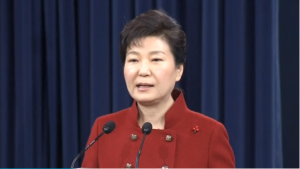South Korea warned North Korea on Wednesday (January 13) that the United States and its allies were working on sanctions to inflict “bone-numbing pain” after its latest nuclear test, and called on China to do its part to rein in its isolated neighbour.
Last week’s nuclear test was North Korea’s fourth, although the United States and experts doubt the North’s claim that it was of a more powerful hydrogen bomb, as the blast was roughly the same size as that from an atomic bomb test in 2013.
 South Korean President Park Geun-hye said further provocations by the North including “cyber-terrorism” were possible, and said new sanctions should be tougher than those in the past, but did not give specifics.
South Korean President Park Geun-hye said further provocations by the North including “cyber-terrorism” were possible, and said new sanctions should be tougher than those in the past, but did not give specifics.
Park said Seoul and Beijing were discussing a draft U.N. Security Council resolution on North Korea, noting that Beijing has stated repeatedly that it would not tolerate the North’s nuclear program.
China is the North’s main ally and trade partner.
“I am certain that China is very well aware if such a strong will isn’t followed by necessary steps, we will not be able to stop the North’s fifth and sixth nuclear tests and we cannot guarantee true peace and stability of the Korean peninsula,” she said.
South Korea and China have grown increasingly close in recent years.
“I believe the Chinese government will not allow the situation on the Korean peninsula to deteriorate further. The best partners are those that will hold your hand in difficult times,” she said.
“Now, South Korea and the United States are closely coordinating and discussing in preparations for a draft (U.N. Security) Resolution against North Korea. We’re also in discussion with China regarding the draft,” Park added.
Meanwhile, North Korean leader Kim Jong Un called for an expansion of the size and power of his isolated country’s nuclear arsenal, North Korean state media reported on Wednesday.
If South Korea develops nuclear weapons in response to North Korea’s fourth nuclear test it would be breaking its “promise” with the world, Park said at the news conference.
“We have been made a promise with the international society, so it would be breaking our promise to the world,” she said.
Parks also said the future of the Kaesong joint industrial zone between North and South Korea depends on the actions of North Korea.
South Korea has limited access for its workers to the zone in the past following inter-Korean tensions, citing security reasons. In 2013, North Korea shut down the zone entirely in response to sanctions for its third nuclear test.
“Whether or not we take any additional steps in the Kaesong industrial Zone is entirely up to the North,” Park said in response to a question on whether the South would considering shutting down the joint project.
Later on Wednesday, South Korea’s top nuclear envoy will meet his U.S. and Japanese counterparts in Seoul and travel to Beijing to meet his opposite number on Thursday (January 14). South Korea’s foreign minister was to speak by phone with his Russian counterpart later on Wednesday to discuss the situation. (Reuters)







